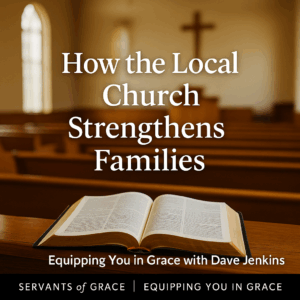⏱️ Estimated Reading Time: 6 min read
“You know what will happen if you pray for patience, don’t you?”
My guess is that you’ve probably overheard some variation of this question before. Perhaps you’ve been on the receiving end. The situation often unfolds like this – God exposes impatience in your heart, and you confess your sin, then you share this struggle with a friend and disclose your desire to grow in holiness.
Then the question comes.
Some people ask it as a light-hearted rebuke. It’s followed by a chuckle. The humor is implied – if you pray for patience, God will bring about circumstances which require a whole lot of it. And why on earth would you want that? There’s a thick strand of sincerity beneath the laughter because comfort is craved far more than holiness. And a prayer which might disrupt or defer that comfort is deemed to be dangerous or just plain foolish.
Other people offer these words as an earnest question to prepare us for what lies ahead. A prayer for growth in holiness is a prayer for discipline. These saints know that “the Lord disciplines those he loves” (Hebrews 12:6). They also trust that the “peaceful fruit of righteousness” awaits those who are trained by the discipline of a loving Father (Hebrews 12:11). And why on earth would you not want that? The question is motivated by love. It’s not given as a reason to fear, but as encouragement to persevere.
One question but two very different motives for asking it. So the real question becomes, whose counsel are we listening to? Will we cling to earthly comforts, or will we strive for holiness no matter the cost?
“Dangerous” Prayers
“Search me, O God, and know my heart!
Try me and know my thoughts!
And see if there be any grievous way in me,
and lead me in the way everlasting!” (Psalm 139: 23-24)
It’s tempting to avoid the final petitions of Psalm 139, to neglect them because they seem a bit dangerous. After all, if we ask God to search our hearts and reveal our wicked ways, the response could be quite disturbing. It’s unsettling when the dark corners of our hearts are exposed to God’s brilliant, searching light. However, it’s far more dangerous to live in denial of our sin than to be confronted by it. To pray this prayer might be dangerous to our egos, but to neglect these searching prayers could be harmful to our souls.
This passage calls us to submit both to God’s correction and his direction. God is the one who will reveal our wicked ways, and he’s the one who will lead his people in the way of righteousness. The psalmist does not expect a response of condemnation or abandonment, but rather gracious correction and continued leading. Why would we expect anything different? We can pray these verses without fear, remembering that God knows us more intimately than we know ourselves.
This is a prayer for holiness, to be conformed more and more to the image of the perfect Son. It’s the daily cry of the believer, “Make me more like Christ!” It’s a prayer that we can be confident God will answer. As Paul writes in Philippians 1:6, “And I am sure of this, that he who began a good work in you will bring it to completion at the day of Jesus Christ.” And again in 1 Thessalonians 4:3a, “For this is the will of God, your sanctification.” What marvelous truths! God will make his people holy. He will do for us that which we cannot do so that we may dwell with him for all eternity.
His Ways Are Higher
However, God answers these prayers for holiness according to his perfect plan, not our personal preference. John Newton, the English slave ship captain turned minister and hymn writer, knew this reality well. In 1779, he penned the lyrics to the remarkable hymn, “I Asked the Lord That I Might Grow.” The hymn begins with a plea for growth in holiness, for “faith and love and every grace.” The prayer is properly aimed in a Godward direction, yet the third verse reveals the speaker’s preference for how this growth might come about in his life:
I hoped that in some favored hour,
At once He’d answer my request;
And by His love’s constraining pow’r,
Subdue my sins, and give me rest.
How often the cry of my own heart echoes those words! I prefer quick and painless, yet Scripture reveals that God’s work of sanctification in our lives is often slow and sometimes painful, at times arriving in unexpected ways.
It’s instructive to follow the progression of the Apostle Paul’s experience in 2 Corinthians 12. We learn that Paul has been afflicted with what he describes as a thorn in the flesh. He recognizes that this trial is attended by purpose as well as pain. It has purpose because it was given to keep him from becoming conceited (2 Corinthians 12:7). Yet the pain is intense enough that he pleads with the Lord three times that the thorn might be removed. The Lord hears his cry, but instead of removing the thorn, he gives grace to endure and to grow.
Paul’s response is stunning. He relinquishes his desire for temporal relief in order that he might know Christ in his suffering. “For the sake of Christ, then, I am content with weaknesses, insults, hardships, persecutions, and calamities. For when I am weak, then I am strong.” (2 Corinthians 12:10) He can suffer this earthly loss so long as he has more of Jesus.
Through trial and suffering and the thorns of this life, God weans us from our love of sin and self, and deepens our love for him. He exposes our utter inadequacy and brings us face to face with our weakness, in order that his power and all-sufficient grace in Jesus Christ would be our only boast. (2 Corinthians 12:9)
Purpose in Pain
God’s discipline is always for our good (Hebrews 12:10). It’s never without purpose. His discipline may be unpleasant to us, yet it is neither arbitrary nor capricious. God is a perfect Father, giving us what we need so that we may share in his holiness.
The default of our flesh is to despise discomfort more than we desire holiness. May we, like Paul, know contentment in the midst of trial, trusting that God’s discipline is purposeful even though it is painful. Newton masterfully conveys the heart of this truth in the hymn’s final two verses:
Lord, why is this, I trembling cried,
Wilt thou pursue thy worm to death?
“‘Tis in this way, the Lord replied,
I answer prayer for grace and faith.
These inward trials I employ,
From self, and pride, to set thee free;
And break thy schemes of earthly joy,
That thou may’st find thy all in Me.”
Christian, pray earnestly for patience, for “faith and love and every grace.” Ask the Lord that you might grow. Do not grow weary when you are reproved, but submit to the gracious correction and direction of your loving Father. Trust that he will produce a harvest of righteousness in his time and in his way. Find your all in him that he might be glorified in you.




